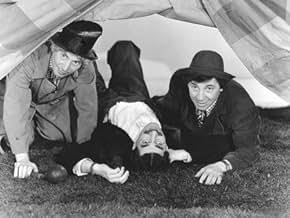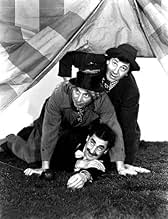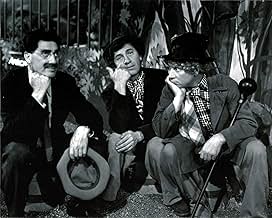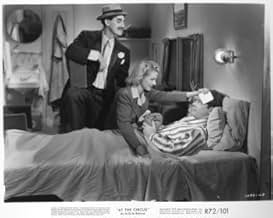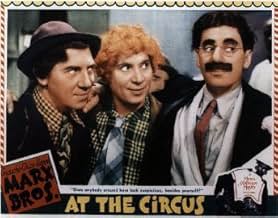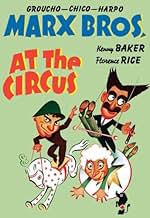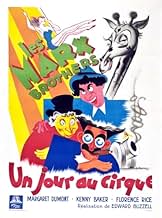CALIFICACIÓN DE IMDb
6.8/10
6.6 k
TU CALIFICACIÓN
Los hermanos Marx intentan ayudar a el dueño de un circo a recuperar fondos que le han robado antes de que acabe sin trabajo.Los hermanos Marx intentan ayudar a el dueño de un circo a recuperar fondos que le han robado antes de que acabe sin trabajo.Los hermanos Marx intentan ayudar a el dueño de un circo a recuperar fondos que le han robado antes de que acabe sin trabajo.
- Dirección
- Guionistas
- Elenco
- Premios
- 2 premios ganados en total
Jerry Maren
- Little Professor Atom
- (as Jerry Marenghi)
Mariska Aldrich
- Mannish Woman
- (sin créditos)
Irving Bacon
- Telegraph Clerk
- (sin créditos)
Willie Best
- Redcap
- (sin créditos)
John Binns
- Old Man
- (sin créditos)
William A. Boardway
- Party Guest
- (sin créditos)
George Bookasta
- Member of Quartette
- (sin créditos)
- Dirección
- Guionistas
- Todo el elenco y el equipo
- Producción, taquilla y más en IMDbPro
Opiniones destacadas
The sad fact about the Marx Brothers is that after the movie A NIGHT AT THE OPERA, their career was all downhill. While A DAY AT THE RACES and ROOM SERVICE were still very good, their subsequent efforts were painfully ordinary and generally unfunny. It was like they were playing lethargic caricatures of themselves. And, from what I gathered, the Marxes WERE very content to just collect a paycheck at this point in their lives.
Some of the blame for the static nature of this film also must be given to MGM--a studio that had a history of ruining good comedians when they came under DIRECT MGM control (Laurel and Hardy's films were distributed by MGM but were created by the independent-minded Hal Roach Studios). If you don't believe me, look at all the Marxes films from the late 30s on as well as Buster Keaton's films of the 30s--they rely on an MGM formula and lack all the frenetic intensity of the comedians' earlier non-MGM efforts.
The film is a by-the-book effort where the Marx Brothers own a circus. Despite this, the film is low on energy and laughs--and should under no circumstances be confused with Chaplin's film The Circus.
Some of the blame for the static nature of this film also must be given to MGM--a studio that had a history of ruining good comedians when they came under DIRECT MGM control (Laurel and Hardy's films were distributed by MGM but were created by the independent-minded Hal Roach Studios). If you don't believe me, look at all the Marxes films from the late 30s on as well as Buster Keaton's films of the 30s--they rely on an MGM formula and lack all the frenetic intensity of the comedians' earlier non-MGM efforts.
The film is a by-the-book effort where the Marx Brothers own a circus. Despite this, the film is low on energy and laughs--and should under no circumstances be confused with Chaplin's film The Circus.
This was my third time watching AT THE CIRCUS and, the characteristically anaemic leads (who somehow always seem to be able to carry a tune) notwithstanding, I've always been kind of partial to this one (even if the end result is, decidedly, a notch or two below their finest work). Plot and setting provide several opportunities for the Marxes to shine, both as a team and individually: Groucho (as always) is the film's trump card, however, especially in his rendition of 'Lydia, the Tattooed Lady' and the separate scenes he shares with befuddled aristocrat Margaret Dumont and scheming circus performer Eve Arden; other highlights include Groucho and Chico's interrogation of the suspicious-looking dwarf, Chico and Harpo's frenzied search for stolen money in the strong-man's room (while the latter is asleep!), and the typically busy climax in which Dumont receives the ultimate humiliation.
AT THE CIRCUS is the Marxes' third best MGM picture (demonstrating a steady decline for them from picture to picture) but it's still inferior to the later A NIGHT IN CASABLANCA (1946), in my opinion or any of their early Paramount films, for that matter.
AT THE CIRCUS is the Marxes' third best MGM picture (demonstrating a steady decline for them from picture to picture) but it's still inferior to the later A NIGHT IN CASABLANCA (1946), in my opinion or any of their early Paramount films, for that matter.
Mercilessly and outrageous Marx Brothers comedy that partially works well , thanks to some funny sketches , though they've done it better before . It suffers from excessive musical comedy plotting , but it gives the zany threesome some funny and really comic elaboration . Here the Marx Brothers try to help the owner of a circus recover some stolen funds before he finds himself out of a job. Antonio Pirelli (Harpo Marx) and Punchy (Chico Marx) , who work at the circus, together with roguish lawyer Loophole (Groucho Marx) , attempt to find the thief and get the money back. The 3 Mad Mullahs of Mirth in their grandest, goofiest roar rodeo! . A tentful of girl-gorgeous musical fun! . Not suitable for general exhibition ! .They're a circus.... in a circus !. This Way Folks...to a tentful of Girl Glamorous Musical Fun! A 30-ring circus of laugh-splashed thrills! The animals are in cages...but the Mad Marxes are on the loose! The Show of Shows...to keep the world Singing and Laughing!. Keep the world laughing!
Relentlessly comical and busy comedy with musical interludes that still works at times . Definitely sub-standard Marxism as the brothers set about saving a circus from bankruptcy in various hilarous set pieces. Amusing moments , mucho ado with badges , Groucho singing ¨Lydia the Tattoooed Lady¨ and the endless insulting repartee with Margaret Dumont , but the whole thing is rather dull and over-familiar. Beginning of the end for the Marxes , a step down in quality from their classic work , though frequently dam fun . Excellent Harpo Marx , as usual , he even did many of his own stunts , he later said it was a silly thing for a 49-year-old . At the Circus (1939) is annoyed by a lot of dated and bored songs , such as : Step up and take a bow , Lydia and Tattoed lady , two blind loves , blue moon . The motion picture was regular but professionally directed by Edward Buzzell , known for : Transient Lady (1935), Little Johnny Jones (1929) y Ain't Misbehavin' (1955) , among others .
Other important films starred by Marx Brothers -many of them Broadway farce plays transfered by scenarists into vehicle for the Brothers- , they are the following ones : ¨Animal crackers¨, ¨Duck soap¨ that was a flop when first released but today considered a masterpiece , ¨Horse Feathers¨, ¨At the circus¨, ¨A night at the Opera¨,¨Day at the races¨ , ¨Room service¨ , ¨Go West¨, ¨Love Happy¨ and ¨Night in Casablanca¨, though in 1946 the Marx formula was weak and wearing thin . Any film with Groucho , Chico , Harpo and Margaret Dumont is well worth seeing .
Relentlessly comical and busy comedy with musical interludes that still works at times . Definitely sub-standard Marxism as the brothers set about saving a circus from bankruptcy in various hilarous set pieces. Amusing moments , mucho ado with badges , Groucho singing ¨Lydia the Tattoooed Lady¨ and the endless insulting repartee with Margaret Dumont , but the whole thing is rather dull and over-familiar. Beginning of the end for the Marxes , a step down in quality from their classic work , though frequently dam fun . Excellent Harpo Marx , as usual , he even did many of his own stunts , he later said it was a silly thing for a 49-year-old . At the Circus (1939) is annoyed by a lot of dated and bored songs , such as : Step up and take a bow , Lydia and Tattoed lady , two blind loves , blue moon . The motion picture was regular but professionally directed by Edward Buzzell , known for : Transient Lady (1935), Little Johnny Jones (1929) y Ain't Misbehavin' (1955) , among others .
Other important films starred by Marx Brothers -many of them Broadway farce plays transfered by scenarists into vehicle for the Brothers- , they are the following ones : ¨Animal crackers¨, ¨Duck soap¨ that was a flop when first released but today considered a masterpiece , ¨Horse Feathers¨, ¨At the circus¨, ¨A night at the Opera¨,¨Day at the races¨ , ¨Room service¨ , ¨Go West¨, ¨Love Happy¨ and ¨Night in Casablanca¨, though in 1946 the Marx formula was weak and wearing thin . Any film with Groucho , Chico , Harpo and Margaret Dumont is well worth seeing .
Music was an integral part of Marx Brothers movies, showcasing Chico's tickling the keys on the piano and Harpo's harp strumming among other singing acts. In the comedy team's ninth film, October 1939's "At The Circus," a number songs and dances were planned, with a heavy dose of parody lyrics embedded in their catchy tunes. Trouble was, MGM boss Louis Mayer didn't feel music should be part of their repertoire. While in the middle of composing the music for the Marx's, songwriters Harold Arlen and E. Y. Harburg were pulled by Mayer to work on 1939's "The Wizard of Oz." Film historians feel his was a good move since the composers wrote some of cinema's best music for the Judy Garland picture, including its number one hit "Somewhere Over The Rainbow."
Before leaving the "At The Circus" production, the two composed one of the Marx Brothers most famous songs, "Lydia the Tattooed Lady." Sung by Groucho, this became his signature song throughout the remainder of his entertainment life. It has also become a staple of many film and television shows, including in 1976's 'The Muppet Show' and in the ninth and tenth seasons of TV's 'The Walking Dead.' The Marx Brothers, crossing the 50-year-old age mark, were looking to retire from film before they even read the script of "At The Circus." Chico's enormous gambling debts created a financial pinch for him, prompting Harpo and Groucho to agree to bail him out as long as he put half of his salary he earned from the movie into lifetime locked-in investments.
Ironically in "At The Circus" Chico plays Tony, an employee for a financially-distress circus whose owner Jeff Wilson (Kenny Baker) is depending on his wealthy aunt, Mrs. Susanna Dukesbury (Margaret Dumont), to provide funding. Tony recommends to Jeff his lawyer friend, J. Cheever Loophole (Groucho), to investigate the disappearance of $10,000 Jeff had saved to pay off his creditor John Carter (James Burke). The shark Carter wants to foreclose on the loan and own the circus when he stumbles across Jeff's hidden savings. With the help of circus strongman Goliath (Ned Pendleton) and Peerless Pauline (Eve Arden), he's able to steal the money.
Performers from the recently-defunct Hagenbeck-Wallace Circus, the second largest circus in the country who shut its doors after 31 years, were hired as extras for "At The Circus." Buster Keaton, near-bankrupt himself, was hired as a gag consultant for the Marx's. He proposed a number of visual jokes, but the brothers nixed them, feeling they didn't fit their brand of humor. Groucho complained to Keaton one day about his type of jokes. The former silent movie comedian confessed, "I'm only doing what Mr. Mayer asked me to do. You guys don't need help."
This was the first movie the Marx Brothers didn't try out their routines in front of live audiences before filming. One particular scene stands out, showing Eve Arden tucking the pouch of stolen money in her bra as Groucho catches what she's doing in the corner of his eye. He talks to the 'fourth-wall,' exclaiming, "There must be some way of getting that money without getting in trouble with the Hays office," meaning the movie censors. He has her perform her circus act by walking upside down on the ceiling, with hilarious results. "The film is definitely one of their finest comedies in terms of set pieces and gags as well as the willingness to bring in some anarchy into any kind of situation," praised Steven Flores, one of the film reviewers who loved the movie.
Groucho was beginning to lose his hair at this stage of his life, and is seen throughout "At The Circus" with an exaggerated toupee. He recalled years later how a stuntman, sweating profusely in a gorilla suit, cut holes in the rented outfit to make it cooler. Its owner was so upset he took back the suit, causing the prop department to scramble for another monkey suit, only to find just a smaller orangutan outfit. Groucho claims it's easy to tell the difference between the two suits.
"At The Circus" proved to be a mix bag for the critics, with Film Daily heralding "The mad Marxmen have never been funnier, nor have they had a better story in which to cavort," while Harrison's Reports labeled it "about the worst Marx picture seen in years. Children should enjoy it, but hardly any adults." The American Film Institute nominated the song "Lydia the Tattooed Lady" for its Top 100 Songs in Movies.
Before leaving the "At The Circus" production, the two composed one of the Marx Brothers most famous songs, "Lydia the Tattooed Lady." Sung by Groucho, this became his signature song throughout the remainder of his entertainment life. It has also become a staple of many film and television shows, including in 1976's 'The Muppet Show' and in the ninth and tenth seasons of TV's 'The Walking Dead.' The Marx Brothers, crossing the 50-year-old age mark, were looking to retire from film before they even read the script of "At The Circus." Chico's enormous gambling debts created a financial pinch for him, prompting Harpo and Groucho to agree to bail him out as long as he put half of his salary he earned from the movie into lifetime locked-in investments.
Ironically in "At The Circus" Chico plays Tony, an employee for a financially-distress circus whose owner Jeff Wilson (Kenny Baker) is depending on his wealthy aunt, Mrs. Susanna Dukesbury (Margaret Dumont), to provide funding. Tony recommends to Jeff his lawyer friend, J. Cheever Loophole (Groucho), to investigate the disappearance of $10,000 Jeff had saved to pay off his creditor John Carter (James Burke). The shark Carter wants to foreclose on the loan and own the circus when he stumbles across Jeff's hidden savings. With the help of circus strongman Goliath (Ned Pendleton) and Peerless Pauline (Eve Arden), he's able to steal the money.
Performers from the recently-defunct Hagenbeck-Wallace Circus, the second largest circus in the country who shut its doors after 31 years, were hired as extras for "At The Circus." Buster Keaton, near-bankrupt himself, was hired as a gag consultant for the Marx's. He proposed a number of visual jokes, but the brothers nixed them, feeling they didn't fit their brand of humor. Groucho complained to Keaton one day about his type of jokes. The former silent movie comedian confessed, "I'm only doing what Mr. Mayer asked me to do. You guys don't need help."
This was the first movie the Marx Brothers didn't try out their routines in front of live audiences before filming. One particular scene stands out, showing Eve Arden tucking the pouch of stolen money in her bra as Groucho catches what she's doing in the corner of his eye. He talks to the 'fourth-wall,' exclaiming, "There must be some way of getting that money without getting in trouble with the Hays office," meaning the movie censors. He has her perform her circus act by walking upside down on the ceiling, with hilarious results. "The film is definitely one of their finest comedies in terms of set pieces and gags as well as the willingness to bring in some anarchy into any kind of situation," praised Steven Flores, one of the film reviewers who loved the movie.
Groucho was beginning to lose his hair at this stage of his life, and is seen throughout "At The Circus" with an exaggerated toupee. He recalled years later how a stuntman, sweating profusely in a gorilla suit, cut holes in the rented outfit to make it cooler. Its owner was so upset he took back the suit, causing the prop department to scramble for another monkey suit, only to find just a smaller orangutan outfit. Groucho claims it's easy to tell the difference between the two suits.
"At The Circus" proved to be a mix bag for the critics, with Film Daily heralding "The mad Marxmen have never been funnier, nor have they had a better story in which to cavort," while Harrison's Reports labeled it "about the worst Marx picture seen in years. Children should enjoy it, but hardly any adults." The American Film Institute nominated the song "Lydia the Tattooed Lady" for its Top 100 Songs in Movies.
7tavm
After 30 years, I just rewatched this latter-day Marx Brothers movie. After being loaned to RKO for Room Service, the Marxes return to M-G-M without their beloved mentor there, Irving Thalberg, having died during their last hit picture there, A Day at the Races. That movie was very enjoyable, if a little long. This one is much shorter, if not as funny. Still, there's more than enough highlights here: a couple of Chico and Groucho scenes like the "need-a-badge-to-get-on-train" and "new-cigar-needed-but-from-suspect-not-Chico", Groucho's number of "Lydia the Tattooed Lady", Harpo's number with some cool black singers mixed with his as-always touching harp solos, Chico's piano playing, and, of course, Groucho's wisecracks with Margaret Dumont, the unofficial fourth Marx brother now that Zeppo left by this time. Oh, and funny enough reunion with Nat Pendleton from Horse Feathers. Also, Fritz Feld has an amusing bit as a symphony conductor. The romantic leads of Kenny Baker, who I know from old broadcasts of radio's "The Jack Benny Program", and Florence Rice don't intrude too much so I didn't mind them or their singing. Oh, and Eve Arden was also a hoot opposite the one and only Groucho. So on that note, At the Circus is worth a look for any Marx fans out there, still.
¿Sabías que…?
- TriviaFor Groucho Marx' performance of "'Lydia, the Tattooed Lady", additional lyrics were written by E.Y. Harburg exclusively for screenings of the film for Allied servicemen in European war zones. The special lyrics included the line "When she stands the world grows littler; When she sits, she sits on Hitler.' This version of the song was filmed, and included in prints of the film distributed in Great Britain and France, and was greeted with marked enthusiasm during screenings in those countries.
- ErroresDuring the "Swingali" number, three boys playing saxophones stand up and play "Auld Lang Syne," but the instruments heard on the soundtrack are clarinets.
- Citas
Peerless Pauline: I've waited so long to find someone like you.
J. Cheever Loophole: Oh, someone *like* me, I'm not good enough for you, eh?
- ConexionesFeatured in From the Ends of the Earth (1939)
- Bandas sonorasLydia, the Tattooed Lady
(1939) (uncredited)
Music by Harold Arlen
Lyrics by E.Y. Harburg
Sung by Groucho Marx and chorus, with Chico Marx at piano
Selecciones populares
Inicia sesión para calificar y agrega a la lista de videos para obtener recomendaciones personalizadas
- How long is At the Circus?Con tecnología de Alexa
Detalles
- Tiempo de ejecución1 hora 27 minutos
- Color
- Relación de aspecto
- 1.37 : 1
Contribuir a esta página
Sugiere una edición o agrega el contenido que falta

Principales brechas de datos
By what name was Los hermanos Marx en el circo (1939) officially released in India in English?
Responda

